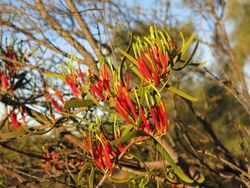Biology:Lysiana
| Lysiana | |
|---|---|

| |
| Lysiana exocarpi | |
| Scientific classification | |
| Kingdom: | Plantae |
| Clade: | Tracheophytes |
| Clade: | Angiosperms |
| Clade: | Eudicots |
| Order: | Santalales |
| Family: | Loranthaceae |
| Genus: | Lysiana Tiegh. |
| Species | |
|
See text | |
Lysiana is a genus of hemiparasitic shrubs endemic to Australia , in the family Loranthaceae.
Description
Lysiana is a genus of aerial shrubs, which are parasitic on the stems of their hosts. They are erect to pendulous, smooth and with no epicortical runners. The leaves are opposite, and sometimes clustered on shortened axes, and flat with pinnate venation or compressed or terete. The inflorescence is axillary, and may be either a pedunculate or sessile two-flowered umbel or a single flower. The flowers have just one bract per flower. The six Petals are united into a curved tube inflated in middle and unequally divided, more deeply so and more reflexed on concave side. The stamens are equal. The anthers are fixed at the base, and about as long as free part of filament.[1]
Species include
- Lysiana casuarinae (Miq.) Tiegh.
- Lysiana exocarpi (Behr) Tiegh. (Harlequin mistletoe)
- Lysiana filifolia Barlow
- Lysiana linearifolia Tiegh.
- Lysiana maritima (Barlow) Barlow
- Lysiana murrayi (F.Muell. & Tate) Tiegh.
- Lysiana spathulata (Blakely) Barlow
- Lysiana subfalcata (Hook.) Barlow
References
- ↑ Barlow, B.A. (1984) Flora of Australia online: Lysiana. Flora of Australia Volume 22 (1984), a product of ABRS, ©Commonwealth of Australia. Retrieved 30 September 2018.
- "Lysiana ". Australian Plant Name Index (APNI), IBIS database. Centre for Plant Biodiversity Research, Australian Government, Canberra. http://www.anbg.gov.au/cgi-bin/apni?TAXON_NAME=LYSIANA. Retrieved 2008-02-29.
- "Lysiana ". PlantNET - New South Wales Flora Online. Royal Botanic Gardens & Domain Trust. http://plantnet.rbgsyd.nsw.gov.au/cgi-bin/NSWfl.pl?page=nswfl&lvl=gn&name=Lysiana. Retrieved 2008-02-29.
Wikidata ☰ Q6710144 entry
 |

